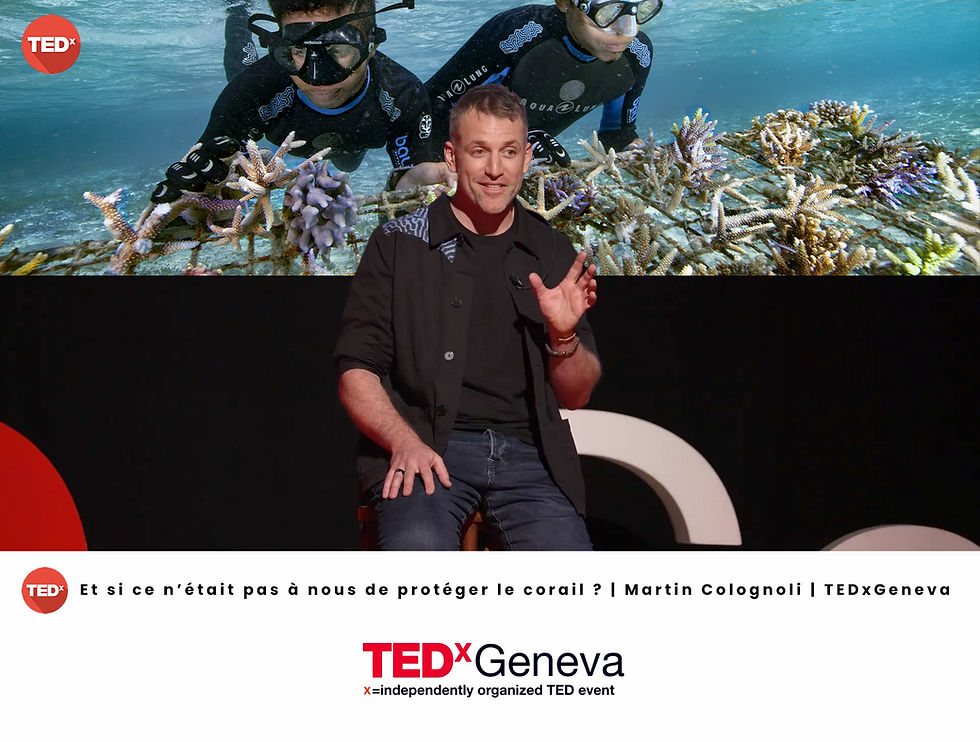The main threats to coral reefs and how to combat them with our training
- Martin Colognoli

- Oct 21, 2024
- 3 min read
Updated: Nov 15, 2024

Coral reefs are among the most precious and vulnerable ecosystems on the planet. Despite their crucial importance for marine biodiversity and coastal protection, they are seriously threatened by environmental and human factors. Fortunately, it is possible to act for their preservation. Thanks to our training, you will discover the main threats to coral reefs and learn the concrete actions to implement to protect them.
1. Global warming: a global threat
Global warming is one of the biggest threats to coral reefs. Rising ocean temperatures are causing coral bleaching events, a phenomenon in which corals expel their symbiotic algae (zooxanthellae) under thermal stress. Without these algae, corals lose their color and, more importantly, a crucial source of energy. If conditions do not improve, they eventually die.
Ocean acidification, caused by increased absorption of CO2 by seawater, is another direct effect of climate change. It weakens the structure of corals by reducing their ability to form calcium carbonate, an essential element in their skeleton.
How to combat this threat?
In our training, you will learn how reefs can be restored and strengthened to withstand these changes. We focus on practical solutions, such as identifying thermal refuges where corals are more resilient to rising temperatures. You will also discover how you can help combat global warming on your own scale, by reducing your carbon footprint and supporting marine restoration projects.
2. Marine pollution: a scourge for the reefs
Marine pollution, particularly plastic waste and chemicals from agriculture and industry, poses another major threat to coral reefs. Plastics floating in the ocean smother corals and disrupt their ecosystems. Chemicals, such as fertilizers and pesticides, cause algal blooms that compete with corals for nutrients and light.
Microplastics and toxic pollutants can also weaken corals, making them more vulnerable to disease and reducing their ability to reproduce.
How to act against marine pollution?
In our training, we will cover strategies to reduce marine pollution at the source. You will learn best practices to limit the use of plastic in your daily life and to support local and international initiatives to clean up the oceans. In addition, we will introduce you to methods for filtering excess nutrients in coastal areas, in order to prevent harmful algal blooms.
3. Overfishing and destructive fishing practices
Overfishing and destructive fishing methods, such as dragging nets or explosives, directly damage coral reefs and disrupt the balance of these fragile ecosystems. Overfishing reduces populations of herbivorous fish, which in turn promotes the proliferation of invasive algae that smother corals. Damaged reefs are less likely to regenerate and become more vulnerable to other threats.
What solutions for sustainable fishing?
Our training will teach you how creating marine protected areas (MPAs) can provide effective solutions. MPAs allow fishing to be restricted in certain areas, promoting the natural regeneration of fish populations and reducing pressure on reefs. You will also learn about sustainable fishing practices that you can encourage and promote in your own communities.
4. Coastal development and unregulated tourism
Urban and tourist development near reef areas also contributes to the destruction of coral reefs. The construction of coastal infrastructure, such as hotels and ports, destroys natural habitats and changes water quality, often making it murkier or more polluted. Unregulated tourism, including diving and anchoring boats directly on reefs, physically damages corals.
How to support responsible development?
In our Masterclass, we will show you how to support sustainable tourism initiatives, such as creating special areas for divers and raising awareness of good practices among tourism operators. You will also learn how to promote reef-friendly coastal development, minimizing human impact and protecting fragile areas.
Conclusion
Coral reefs are essential to the health of the oceans and the survival of many species, including our own. By understanding the main threats to them, you will be better equipped to take action at your level and contribute to their protection. Our training not only provides you with theoretical knowledge about these unique ecosystems, but also practical and concrete solutions to combat these threats. Join us and become a key player in the preservation of coral reefs!
Scientific references
Hughes, TP, et al. (2017). Coral reefs in the Anthropocene . Nature, 546(7656), 82-90.
Moberg, F., & Folke, C. (1999). Ecological goods and services of coral reef ecosystems . Ecological Economics, 29(2), 215-233.
Hoegh-Guldberg, O., et al. (2007). Coral Reefs Under Rapid Climate Change and Ocean Acidification . Science, 318(5857), 1737-1742.





